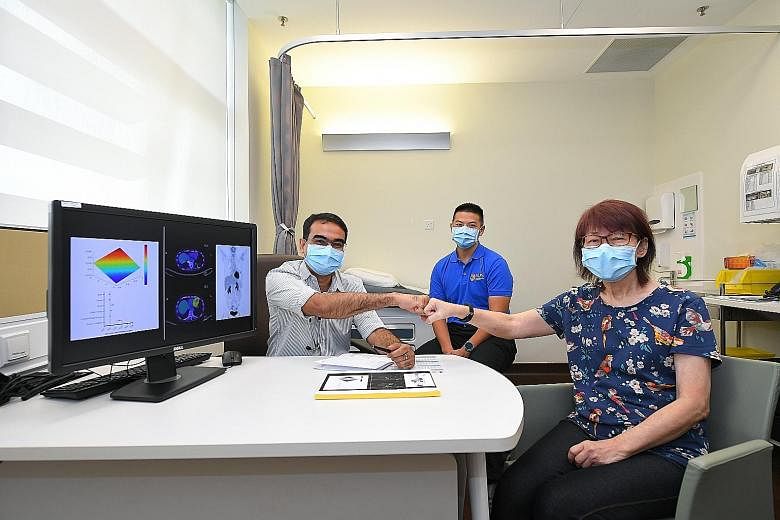After six years of being cancer-free, Madam Peggy Tay, 71, was distraught to find out in January last year that her lymphoma - a cancer that attacks infection-fighting white blood cells - had returned.
Hers was a particularly aggressive type of lymphoma called Diffuse Large B-cell Lymphoma (DLBCL).
She responded briefly to salvage chemotherapy, a standard treatment for relapsed lymphoma. But the disease resurfaced again in September last year.
This time, however, she received a lifeline in the form of an artificial intelligence digital medicine platform developed by researchers of the Cancer Science Institute of Singapore (CSI Singapore) at the National University of Singapore.
It helped to derive and customise the most effective drug for her.
The AI platform - called Quadratic Phenotypic Optimisation Platform (QPOP) - analysed a small tumour sample taken from her and ranked her cancer cells' potential response to more than 530,000 drug combinations with 12 types of drugs used for lymphoma.
In less than a week, QPOP showed that Madam Tay's cancer was vulnerable to a combination of two drugs, palbociclib and everolimus, which has been used only for breast cancer.
Erring on the side of caution, her medical team decided to put her on a standard chemotherapy treatment for relapsed lymphoma called R-GDP last September.
But, as predicted by the AI platform, it made things worse.
"That chemo really hated my body. I was breathless and my body was weakened, I had high fever, I lost a lot of weight and I just wasn't able to understand my body," said Madam Tay.
Instead of responding to the gruelling treatment, the tumour in her chest also grew bigger, said Assistant Professor Anand Jeyasekharan, the oncologist who treated her at the National University Cancer Institute, Singapore.
It was back to the drawing board for the research team and they decided to give QPOP's recommendation a try last December.
Madam Tay and her daughter were also eager for her to try it when they heard the drug combination responded well to her tumour sample.
Within two weeks of taking the oral anti-cancer pill, her high fever went away.
Five months into taking the medication, her chest tumour disappeared and she is now in remission. The only side effects she suffered were rashes and blisters on her leg.
Prof Jeyasekharan, who is also a researcher at CSI Singapore, described relapsed DLBCL as an area of "unmet clinical need". He said: "Patients with a disease that is resistant to more than two lines of chemotherapy do poorly. CAR-T cell treatment is promising, but cost can be a key consideration."
Two lines of chemotherapy refer to the initial treatment and a subsequent one while CAR-T cell treatment is a form of immunotherapy that uses specially altered T-cells in the immune system to fight cancer.
But the CAR-T treatment is not yet available outside of clinical trials here, and can cost $500,000, said Prof Jeyasekharan.
Madam Tay's treatment cost about $4,000 a month and it lasted five months.
On the research front, she was one of 36 patients who agreed to have their tumour and blood samples run through QPOP for a clinical research study headed by Associate Professor Edward Chow, principal investigator at CSI Singapore and leader of the team that developed QPOP.
Work on the AI platform started in 2014, and the clinical study began in 2018.
For 31 out of 36 patients, QPOP was able to come up with potential treatment reports. It predicted that standard treatments would not help in 18 of the cases. Four of those, including Madam Tay, were offered drug combinations used before in the clinic.
For the rest, QPOP derived drug combinations that had never been tested on any cancer before, said Prof Chow. "But QPOP provided a backlog of information for future clinical research on some of these potentially interesting combinations," he added.
The researchers' next step is to raise funds to conduct a clinical trial involving 60 patients with relapsed lymphoma.


